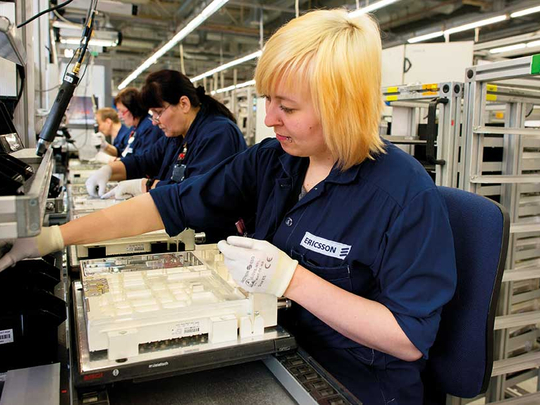
Stockholm: Sweden’s Ericsson AB will start US manufacturing this year, a production shift that gets the wireless network supplier closer to customers and also may mitigate the impacts of President Donald Trump’s global trade disputes.
Chief Executive Officer Borje Ekholm said Jabil Inc. will produce Ericsson’s mobile network gear in the final quarter of 2018, when the Swedish company will also decide whether to build its own US production capacity or continue relying on the St. Petersburg, Florida-based manufacturing services company.
“There are pros and cons to all solutions,” Ekholm said in a phone interview. “First, we need to make sure that we start local production. The US is about a quarter of our sales and an incredibly important market.”
Ericsson will also step up research investments in the US, hiring about 400 engineers to strengthen product development, it said in a statement Friday.
Ericsson’s decision comes as the country’s major carriers prepare to build fifth-generation networks that will enable faster download speeds, less signal delay and more simultaneous connections to multiple devices.
Ekholm said his company needs to bring development and production closer to some of its most important customers, to support “the very rapid roll-out of 5G that we anticipate.”
Ericsson currently makes network equipment in Estonia, Mexico, India and China, and having local production in the US will increase the flexibility of its global supply chain, Ekholm said. The company decided to close the last of its major Swedish production sites two years ago.
Ericsson’s US move comes as several large global companies are thinking about how to tackle the effects of Trump’s trade war. Milwaukee-based Harley-Davidson Inc. has said it will shift production of motorcycles shipped to the European Union from the US to overseas plants, and Swedish measuring technology giant Hexagon AB said last month it’s investing more in local engineering, to mitigate the risk of “a complete shutdown between the trading blocs.”
Among US manufacturers, Caterpillar Inc. and General Motors Co. have said tariffs on steel are cutting into their profits and forcing them to raise prices.
Under Ekholm, Ericsson has cut operating costs and invested in research, a strategy designed to address a collapse in profitability under his predecessors.
After a rocky start, Ekholm appears to have gained momentum in recent quarters, helped by increasing sales in North America, and shares in the company have gained 32 per cent this year.
In the US market, Ericsson is facing fierce competition from Nokia Oyj, which recently denied claims it’s losing market shares to its Swedish rival.
With Huawei Technologies Co. blocked from selling equipment due to security concerns, Nokia and Ericsson are the only major suppliers of cellular network infrastructure that are allowed to freely sell their gear in the US.
The Finnish company, which hopes its broader product portfolio will give it an edge in that rivalry, last week announced its largest 5G contract to date, a $3.5 billion deal with T-Mobile US.
Ekholm, who has dual Swedish and US citizenship, declined to comment on market shares, but said “we are very happy with our development in North America.”










